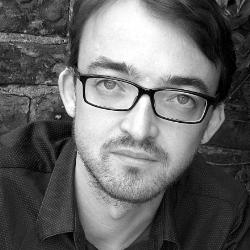Tim Watts: Artist-in-residence, Institute of Astronomy
My interest in the relationship between music and astronomy was sparked by my collaboration with the historian Ulinka Rublack on the opera, Kepler’s Trial. This tells the story of the witchcraft trial of Johannes Kepler’s mother, Katharina, and traces the collision of science and superstition in early seventeenth-century Germany. It was premiered in 2016 at St John’s College, Cambridge, where I am a Fellow, and performed again at the Victoria & Albert Museum in 2017.
I have recently returned to Kepler for a new work for the Gesualdo Six – Kepler-Motetten – which sets some of Kepler’s own words on the subject of celestial music from The Harmony of the World (1619) alongside poetry addressed to him by the German Romantics, Novalis and Hölderlin. This piece was commissioned by Kepler’s alma mater in Tübingen, Germany, as part of an event exploring the role of ‘religious knowledge’ in Kepler’s work. The intersection of poetic, religious and scientific experience, while potentially fraught with misapprehension, suspicion and hostility, is an area that holds particular fascination for me.
Forthcoming projects as part of my residency at the Institute of Astronomy include a new anthem for Ely Cathedral’s Science Festival (20th May 2019), setting words from the biblical Book of Job and a new work for narrator and ensemble for the King’s Lynn Festival (24th July 2019) telling the story of the Big Bang. I am also planning a set of songs setting words by contemporary astronomers and a work that looks at seventeenth-century imaginings of lunar exploration and extra-terrestrial life.
.

